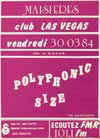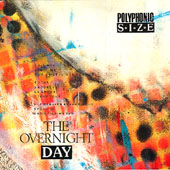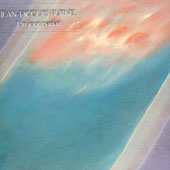| |
DOMINIQUE
BUXIN INTERVIEW, part 4
|
WALKING
EVERYWHERE
BRUSSELS
WALTZ
• Doro : Obviously a reference to the Stranglers Walzinblack, but there's
not very much to say about it here, because it's pure instrumental music.
Dominique : Yes, tchak tchak boum, tchak tchak boum.
LE
RABATTEUR DES SECTES
• Strange kind of man, a mercenary working for sects ?
D : Definitely. A new kind of sectarian. Actually, this is what happens
with sects. Soliciting you in the streets, inviting you to conferences...
Everything sounds beautiful and then, you don't realize what's going
on, your life is caught in the system, and the brainwash begins.
|
 |
IRRIGATION
• Great erotic song. I don't think the "geopolitic" side
of it is really meaningful, but the sexual side is, for sure. RM told
me once that some belgian newspapers were hurt by this one, thinking
it was a sexist song.
D : Never heard about that. OK, it wasn't sexist, but sexual. At least
in my mind. I speak about sexism and colonialism in the third verse
: « Si t’es coopérante / Je te parfumerai / Ma belle
indépendante / Je t’eau d’cologniserai». As in
Le rabatteur des sectes , I don't identify myself with the guy in the
song. It's just a way to write lyrics about something you don't agree
with. Like Jacques Dutronc in « L’opportuniste », for
instance.
|
EUROPE,
WHAT ARE YOU DOING?
• This is a very special song. Every verses are written in german.
Is it a european manifesto, sung by JJ Burnel ?
D : Verses are in german, chorus in english and the break in both languages.
This is a kind of nano-manifesto, about a united Europa, not a fake Europa.
It sounded obvious that this song had to be sung by Jean-Jacques, who
made his « Euroman cometh » LP. There's even a little reference
to his album in the lyrics : « Von Brüssel bis Strasbourg /
Von Berlin bis Roma / Europa ist nur / Ein Bild für Beaubourg –
De Bruxelles à Strasbourg / De Berlin à Rome / L’Europe
n’est qu’une / Image pour Beaubourg.»
Take a look at JJ's album picture sleeve : you'll see the Beaubourg museum
behind him. |
 |
PARLEZ-VOUS
• I must confess I don't like that one very much. Too serious.
Too basic. It's sounds like the 3rd album, which is not my favorite
one.
D : Well, I guess it was my "middle of the road" moment.
« Parlez-vous / Le bonheur est dans les mots ».
But I really loved the verse : « Nos tête-à-tête
/ sont des face-à-face… ». |
WALKING
CLASS HERO
• Another great song sung by JJ. Was it him, the walking class
hero ?
D : No no, just a imaginary guy running after a girl all around the
world. And just like John Lennon's « Working class hero »,
his life is not easy.
He's driving crazy at the end of the song and decides to give up : «
So why go everywhere / when everywhere’s nowhere.
And once again, there's a reference to another song, this time to «
Hiroshima » with the word « Heroshima. »
LE
ROCKER DE LA CIA
• This rocker reminds me SAS (famous french spy novels)
: spying, sex, violence, travels. An explosive mix.
D : And not far from the reality... See the contacts between CIA and
KGB in those days.
AND when you know that, in the 80's, the USA helped Ben Laden during
the Afghanistan war against Russian... Well, you can say that the worse
is always possible. |
MOHAMMED
& SARAH
• 20 ans later, nothing has changed. It's even worse.
D : This is a song I really like. The lyrics were inspired by tags written
in Brussels at the end of the 70's. You could see « Palestine
vaincra » and « israël vivra ». A kind of graphic
fighting. The song is about the meeting of love and politic. Classic
tragedy story, like in Corneille or Racine, and Shakespeare, of course.
« Roméo & Juliette » is quoted in the song, and
« Winston & Julia » as well.
The end is utopian (« Et qu’enfin de leur union / Puisse
naître une nation). But without utopia, dream is just merchandise.
ICI
OU LA
• Is this song about an anti walking class hero ? A guy stuck at home,
dreaming he's somewhere else ?
D : It is. The lyrics were based on sounds, like in pulp stories : «
Cinq gars pour Singapour » or « Moche coup à Moscou
».
For example :
« Lima Lomé ou Mexico
Qui va l’aimer un mec si con ».
The guy in the song was also inpired by « Raymond Calbuth »
, a comics book designed by Tronchet. |
 |
• Now it's time to talk about Polyphonic Size dark days, after 1984 and
the 2d LP, when the band was in war against its records compagny, and
couldn't make another album. How did you feel it ?
D : Well, I wasn't on the front line, so I wasn't hurt as much, but
I remember there was a mix of anger and deception, but also the desire
to carry on.
• There were many unreleased songs recorded between the 2d and the 3rd
LP : Do The Hou, No Colours, Lovestorible, Propagande, Love By Love,
Les Petites Filles, NY Un Soir, Take Your Guns, Gros Plan... Did you
write everything ?
D : Yes, I did. Everything except « Gros Plan », that don't
remind me anything .
|
• There were also two Jacques Dutronc songs, with new lyrics you wrote.
D : Two songs ? I only remember one. But it should be re-written again,
at least because of chinese population number :
« Onze cents millions de petits Chinois / Et moi et moi et moi /
J’ose enfin sortir de chez moi / Mais des problèmes j’m’en
mords le chinois…). Well…
• Then came 1986 and a new single : l'Amour / Everybody Needs Your Sex.
The A side is far different from what you wrote before : no play with
words, no ambiguity. It's a rather depressed love song. I must admit it's
not my favorite PS song ever.
D : Well, « L’amour » is actually different from PS other
songs. More basic stuff, except for the end of the song, maybe (J’ai
encore rêvé). It got several references about what happened
in those days : the missiles, Le Pen, the « Touche pas à
mon pote » movement. Its not my favorite song either. |
• the B side is a surprising kind of french rap experimentation. With
a very PS sexual touch.
D : Qu'est-c'qui s'passe / quand ça se casse / méli-mélo
/ c'est la mélasse/... There was a very jerky rhythm, so I had
to write short verses. But I'm not sure I would call it rap. Well, maybe
a PS rap.
• it's spoken lyrics and funky rhythm, that's why I called it a kind of
rap. Actually many PS songs are spoken, not sung : Saison, Mode, Nagasaki,
Hiroshima 1945, Mother's Little Helper, Men & Construction, Irrigation,
... The "real songs" (Winston & Julia, Je t'ai toujours
aimé, walking Everywhere) were mostly sung by JJ.
D : Yes... You should talk Roger-Marc about that.
• let's go back to 1988 and the third LP (The Overnight Day). It was the
very first time you didn't write the whole lyrics. I guess it wasn't
easy.
D : Non, I don't think so. I gave Roger-Marc some lyrics, but some songs
were written by other people, so there were other texts. I guess Martine
wrote a few.
• Which songs did you write ? The sleeve notes don't tell very much about
it.
D : Well, I wrote Dis-moi / Le soleil des voyous / L’amour / Le
dernier rendez-vous / Mon fils-my son. |

|
• Don't you think all those lyrics sound quite different from PS early
days ? More serious. Without the odd and sexy feeling of Space Rejection,
Saison or irrigation, for instance.
D : Yes, maybe it was because we wanted to show a new side of PS. I
like pretty much « Le soleil des voyous » who talks about
the « Shoah » .
Much later, I learned that it was also the title of a old movie made
by Jean Delannoy, with Jean Gabin and Suzanne Flon… A total different
subject. Anyway, in our case, Le Soleil Des Voyous was about nazies,
and why you have to fight against them. Hey everybody, gimme a favour,
if you see a swastika anywhere, rub it out. That's all.
|
| UN
JOUR PARFAIT |
• You also wrote 3 songs for Un Jour Parfait, JJ Burnel's 2nd solo LP :
Via Dolorosa, Le Whiskey, and Rêves. How did this new collaboration
happened ?
D : once again, I just gave him some lyrics. He wanted to sing in french
on this album. So he just picked up a few of them and here it is : 3 songs.
• Via Dolorosa (Way Of Cross) is about prostitution, right ? S & M ? |
 |
D :
That's it, but harder. Actually, « Via dolorosa » is a street
in Jerusalem old city where Jesus made his «way of cross»
soon before his crucifixion. That's why the song is mixing sex and religion.
Prostitutes life isn't always easy, that's why love can be their way
of cross.
• Le Whiskey is another song about booze, like "Je bois" by
Boris Vian or Gainsbourg "Intoxicated Man" ?
D : Well, nice company, right ? The very first time I heard this song
was on France Inter radio, in Jean-Louis Foulquier's program. Sounds
like he loved both whiskey and song, 'cause he played it 2 times.
• Rêves appears in a different version on the Black K7, under the
name of Dreams. It's a very bluesy song. Is it about the end of the
80's ? End of dreams ?
D : « Rêves » is a mix of two songs : "Dreams
never satisfied" (with english chorus and french verses) and «J’ai
le blues/Do the blues». Jean-Jacques mixed them together. I like
it. Yes, lyrics are very bluesy. I don't know if it's because of the
end of the 80’s. We all can have the blues sometimes. Might be
a good thing to turn it into a bluesy song. |
 |
• There is at least 2 unreleased songs from the Un Jour Parfait sessions
: "Et Pourtant" (which will later surface on Dani's N Comme
Never Again album), and" Lèche-vitrine". The second one
sounds very much Dominique Buxin. is it yours ?
D : It isn't, but I'd like to ear them !
• You kept on working with Polyphonic Size after The Overnight Day, but
many songs stayed unissued : Earcom (presented in PS info service n°2),
and freedom. Some more ?
D : I remember some other songs, recorded in a Brussels studio: «
New York un soir », and « G.I. Gino » , with great Roger-Marc
vocals. There were more on cassettes : Emilia…. With some little
work, this could easily make a full CD. |
• OK, I suggest a little game to close this interview,
Each question is 2 possibilities. You choose one, and explain why.
Let's go :
• Tintin or Spirou ?
D : Spirou. I was a Spirou subscriber when I was a boy. The postman
arrived on his bicycle... I got so exited when I turned the pages, looking
for my favorite heroes : La patrouille des castors, Sandy et Hoppy,
Timour, Johan et Pirlouit. I even went « Brigadier M »,
a kind of milk drinker diploma. Today, it would be « sucker M
» instead, for all the hamburgers and sodas addicts !
• Stones or Beatles ?
D : Beatles. The Stones might be the greatest rock band ever, but the
Beatles got a greater musical space. Among the Beatles, I was mostly
intersted in John Lennon. Anyway, I was a Led Zeppelin fan in those
days.
• Beer or whiskey ?
D : Beer. It's better on a long-term.
• Dog or cat ?
D : If I answer cat, my dog won't appreciate. When I was younger, I
had a half wild cat, who could run away for 2 weeks sometimes. But now
I got a dog, and he's sitting on my knees while I write those lines.
• Marlene or Marilyn ?
D : Marilyn. But my favorite one was Brigitte Bardot.
• Johnny Hallyday or Claude François ?
D : Well, Johnny, of course. Claude François is better when he's
trying to imitate Benoît Poelvoorde.
• SAS or Bob Morane ?
D : Bob Morane. I read tons of them when I was at the boarding school.
It helped me to escape.... I was afraid of « L’ombre jaune
». In those days (1966), There was a little documentation at the
end of the books. Quite interesting. But Bill Ballantine should not
have put ice in his whiskey. Bob Morane shouldn't have let him do that.
• Mono or Stereo ?
D : Stereo. Looks like we got 2 ears, right ?
• God or Devil ?
D : Sorry, Never heard about those guys.
• Yes or no ?
D : maybe. |
Interview
made in January 2006, except the intro (August 04). |
| Back
to Dominique Buxin interview : Part 1 / Part 2 / Part
3 . Read more Dominique Buxin's lyrics in this
page. |
|







